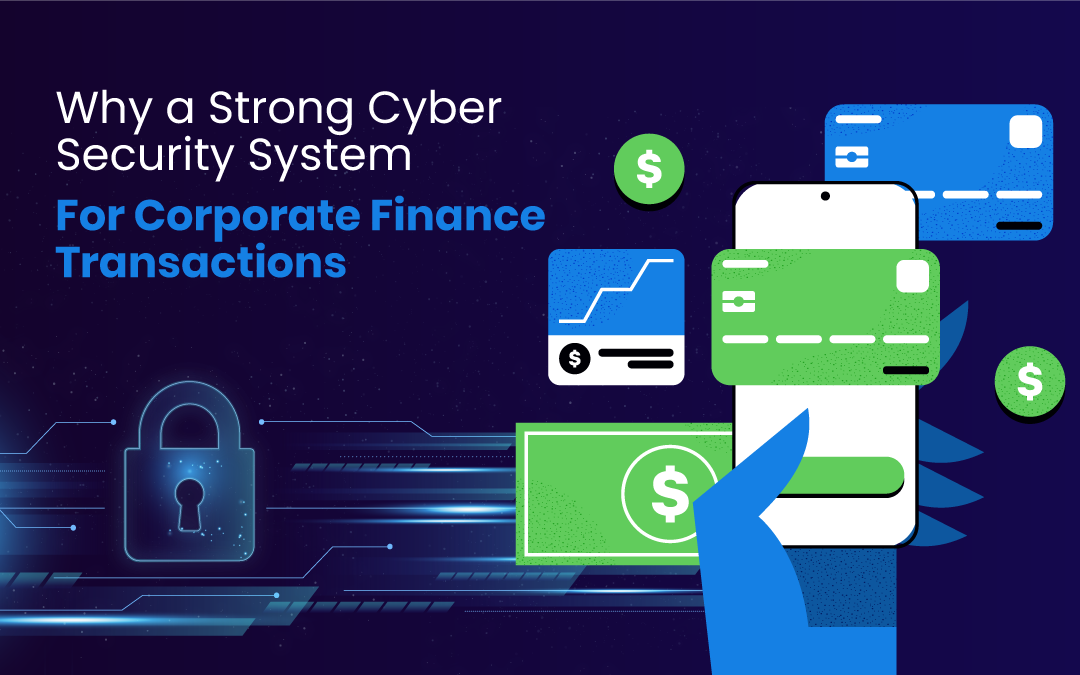
Corporate finance transactions are the lifeblood of modern businesses, allowing small and large companies to make long-term plans, expand, and respond to constantly changing market conditions. Corporate finance transactions can refer to a wide range of business activities, including mergers and acquisitions, stock investments, invoices, and customer payments. All transactions, no matter how simple or complicated, require a secure and efficient payment process.
In this article, we will go over the importance of establishing a strong cyber security system that can securely handle financial transactions, and how opening a business bank account can help businesses bolster their cyber security systems. We will also discuss the risks involved in performing corporate finance transactions, as well as strategies you can use to lower the risk of a data breach or loss of funds.
Understanding corporate finance transactions
A business that is engaged in a corporate finance transaction may be moving, receiving, or sending large sums of money. They may also be transferring complex legal agreements, or exchanging sensitive company information across different servers and into the hands of third parties. A business may also, for example, perform a merger with or acquire another business in their industry. This lengthy process would involve complicated legal and financial negotiations and a transfer of funds.
They could also conduct an initial public offering (IPO), which is the process by which a private company becomes public, allowing it to buy and sell shares in its business on the stock market. This would also involve performing corporate finance transactions and would require a robust cyber security infrastructure to ensure that there is no point where sensitive company details are leaked.
For businesses regularly engaging in corporate finance transactions, having a secure and reliable business bank account is more of a requirement than an optional convenience. This is because a high-quality business bank account provides numerous important features that can have a major impact on the outcome of a corporate finance transaction. Businesses should perform thorough research into comparing business bank accounts, best available on online search engines or trusted third party sources, and compare and contrast each bank account’s features. One feature to look for is intelligent, in-built security and information handling. This is designed to help prevent financial fraud and unauthorised access to sensitive company information, which is especially important when dealing with significant sums of money.
Business bank accounts also provide companies with sophisticated cash flow management features that can simplify often complicated corporate transactions. On top of this, premium business bank accounts usually come with specialist support services, which can be essential if businesses run into issues during high-stakes financial transactions. They can also be integrated into financial/cash flow management systems, ensuring the smooth transfer of data and reducing the possibility of errors in financial reports.

The importance of cyber security for modern corporate finance transactions
Nowadays, most corporate financial transactions are performed on digital platforms instead of in person, meaning a firm’s cyber security system is of more importance and relevance now than it has ever been. In the modern age of online business deals and transactions, sensitive financial data, business innovations, and personal information are all kept and transmitted digitally. Although the switch to digital storage and transfer software has increased the efficiency and speed of corporate finance transactions, it has also created new opportunities for cyber criminals to intercept and steal sensitive data. Malicious actors are developing and employing more intelligent and adaptable technologies to help them exploit flaws in online financial systems. A cyber attack during a high-stakes and high-value finance transaction can have serious long-term repercussions for a business, including financial losses, reputational damage, and regulatory fines.
Risks involved in the transaction process
For both small and large enterprises, cyber security concerns can exist at any stage of a corporate finance transaction. For example, during the initial due diligence and research phase before a deal is formalised and transacted, large amounts of sensitive data are transmitted between parties via digital channels. This transfer of information can be particularly vulnerable to data breaches orchestrated by bad-faith actors, if suitable cyber security measures are not in place.
Similarly, the negotiation phase of a corporate finance transaction frequently involves sending and receiving sensitive communications that can jeopardise an entire transaction if intercepted. The actual transfer of a large sum of cash during the latter stages of the transaction process is also of particular interest to cybercriminals, who may possess the technology and intelligence to intercept and reroute funds away from the target destination. This is particularly true for high-profile corporate finance transactions conducted by bigger, well-known firms.
How cyber security helps reduce these risks
A strong, regularly tested cyber security system is a non-negotiable for any business conducting digital corporate finance transactions. It can help protect sensitive data from falling into the wrong hands with the use of multiple advanced technologies. These include encryption, which makes data hard to decode even if it is intercepted by hackers, multi-factor authentication, which requires multiple codes and passphrases before allowing access to sensitive information, and other secure data storage technologies.
For larger firms with greater financial and human resources, there are more advanced cyber security solutions, such as continuous network monitoring to automatically detect and respond to potential threats in real time. A preventative strategy like this can help firms ensure that minor security mishaps do not turn into large, costly, and damaging data breaches. This can also help businesses avoid lengthy and reputationally damaging lawsuits for failing to properly secure sensitive information.
A strong cyber security system should also include multiple damage limitation strategies to ensure that, if a breach occurs, there is a clear and fast-acting protocol in place to make sure the breach is rapidly contained. Businesses should also make sure their IT and cyber security professionals are regularly performing threat assessments of all the companies and third parties engaged in a corporate finance transaction, in order to identify any weak links in the chain before they are exploited.
As touched upon, one of the most important and sensitive parts of any business finance transaction is the transfer of funds from one party to another. These can range from a payment for an acquisition to the receipt of investment funds, and usually involve large sums of money. A robust cyber security system can help ensure that these transfers are completed securely and reach their intended recipient. This system should include strategies like encrypted channels for all financial communications, and fraud detection algorithms that use complex mathematical equations to assess the likelihood of fraud or tampering during a finance transaction.
The future of cyber security in corporate finance transactions
It is unfortunately inevitable that as technology continues to evolve, so will the cybercriminals who aim to exploit weak links within this technology. Businesses that regularly engage in corporate financial transactions should continually test their cyber security systems and incorporate more advanced security solutions as and when they are available. These include technologies such as AI-powered threat detection systems and blockchain-based secure transaction platforms, which will make data both harder to intercept and to decrypt if intercepted. Companies that proactively invest time and resources into improving their cyber security systems will be better able to protect themselves from costly fines and lawsuits, uphold their brand reputation, and become more appealing partners in future corporate finance transactions.
Share this post
Leave a comment
All comments are moderated. Spammy and bot submitted comments are deleted. Please submit the comments that are helpful to others, and we'll approve your comments. A comment that includes outbound link will only be approved if the content is relevant to the topic, and has some value to our readers.

Comments (0)
No comment